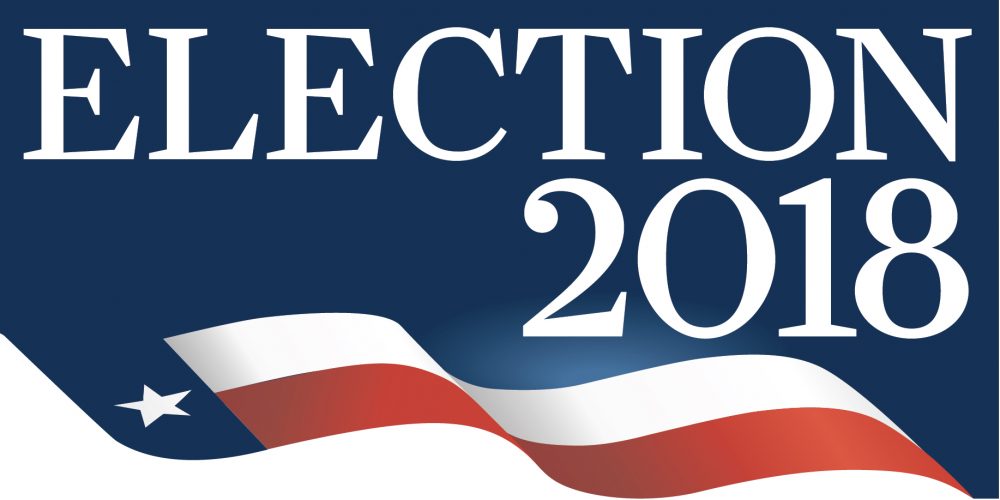What Pennsylvania Special Election Tells Us About November
Individual races are idiosyncratic. But there are nonetheless some lessons here.
Votes are still being tallied in Tuesday’s special election in Pennsylvania’s 18th Congressional District but Democrat Conor Lamb has a slight lead that Republican Rick Saccone is unlikely to make up with the outstanding absentee ballots. As always, there’s a tendency to extrapolate the results of one, idiosyncratic contest to the next big election:
[T]he Democratic Congressional Campaign Committee blasted out a statement declaring Lamb the victor, despite the fact that the AP said they would not call the race Tuesday evening.
“These results should terrify Republicans…..Candidates and message matter and that was on full display in this election,” DCCC Chairman Ben Ray Luján said.
And there’s certainly enhanced reason to do so this time:
President Trump won this Pittsburgh-area district by about 20 points in 2016, but it’s Lamb who has run a high-energy race to challenge Saccone, after Rep. Tim Murphy, R-Pa., resigned last year amid a sex scandal. Republicans have privately grumbled that their candidate has been lackluster, and the Democrat could be poised to pull off the upset. Polls closed at 8 p.m. ET.
If Lamb does eke out the win, it would be the latest sign of worry yet for Republicans this fall. It’s evidence of just how motivated Democrats are in 2018 and shows that the blue collar coalition President Trump was able to build in the 2016 campaign is not necessarily transferable to other Republicans.
While the close margin may give some solace to wary GOP members, it’s still another example of Republican candidates way underperforming not just Trump’s 2016 numbers, but the past performance of the district, too. Murphy routinely won re-election and didn’t even face a Democratic challenger the past two cycles. Other special congressional elections last year in deep red territory in Kansas, Montana and South Carolina also ended much closer than expected.
If Republicans do lose this seat, the fact they were unsuccessful also shows that the GOP’s economic argument to voters and touting its tax cuts may not be enough to save the party at the ballot box, either. While early ads in Pennsylvania focused on a fiscal message, closing arguments from Republican outside groups hit Lamb on immigration and crime instead.
Trump visited the district for a rally on Saturday as a last-ditch rescue mission, where he asked his supporters, “Do me a favor. Get out on Tuesday and vote for Rick Saccone.” Trump also referred to the Democrat as “Lamb the sham,” saying that if elected, Lamb would vote as House Minority Leader Nancy Pelosi wants, even though the candidate has said he would not support keeping her as leader of the Democratic caucus.
Vox’s Dylan Scott goes much further (“The Pennsylvania special election shows the 2018 House battleground is enormous“):
Set aside who actually won the Pennsylvania special House election between Democrat Conor Lamb and Republican Rick Saccone — which we might not know for a while yet — and look at the big picture: Republicans are in big, big, big trouble.
Donald Trump won Pennsylvania’s 18th Congressional District by nearly 20 points. The House special election will be decided by less than a percentage point, in either Lamb or Saccone’s favor (and maybe after a recount?). That is a huge swing toward Democrats.
When you take a step back and look at the 2018 race for the House, you realize: There are more than 110 Republican-held House districts that Trump won by less than he won in the district where the Republican House candidate just effectively tied with the Democrat.
Strategists and election analysts on Twitter couldn’t quite agree on exactly how many districts — 114? 118? 119? — but the number is, by all accounts, greater than 110. A few months ago, you wouldn’t have heard Democratic operatives, even at their most optimistic, describe the 2018 battleground as that big. (As of last month, Democrats had just expanded their battleground map to 101 seats.)
There are the districts Hillary Clinton won, of course, but there are also the suburban, classically Republican districts where Trump has soured the electorate, and those white working-class districts with Obama-Trump voters.
This comes with plenty of caveats. This was a special election. Republican incumbents are going to be stronger than Republicans in an open seat like the Pennsylvania 18th. Conor Lamb was a particularly strong Democratic candidate, and Rick Saccone might have been an unusually weak Republican nominee.
But still: Democrats need 24 seats to reclaim the House majority. If Tuesday night is any guide, it looks like they will have a lot of opportunities to get them.
It wouldn’t shock me at all if Democrats took back the House, even by a considerable margin. President Trump is exceedingly unpopular and, rather than settling into office, his administration seems to be getting more chaotic by the day. There are a multitude of scandals, ranging from porn stars to graft to Russian influence, to which Republican Congressmen seem determined to tie themselves. And we’ve seen wave elections during midterms before in similar circumstances—massive ones in 1994 (Republicans +54 House seats, resulting in a change in party control) and 2010 (Republicans +63 House seats, resulting in a change in party control) and modest ones in 2006 (Democrats +36 House seats, resulting in a change in party control).
Still, we need to be cautious about projecting too much from one race. In the case of Doug Jones’ victory over Roy Moore in the special election to fill the Alabama Senate seat vacated by Jeff Sessions when he became Attorney General, Moore was a particularly awful candidate who was intensely disliked by many Alabama Republicans even before 11th hour revelations that he was a serial dater of underage girls. Similarly, Lamb was an unusually attractive candidate and Saccone an unusually bad one.
That said, we don’t have just these two contests. 538’s Harry Enten wrote in December that the special election results up to then pointed to a Democratic wave:
There have been more than 70 special elections for state and federal legislative seats in 2017 so far.1 We’re interested in each of those contests, naturally, but we’re also interested in what the races tell us about the national political environment. To measure that, we compared each special election result to the partisan lean of that state or district2 — how we’d expect the state or district to vote in a neutral environment (i.e. an environment in which a Democratic and Republican presidential candidate would tie 50-50 nationally).
So, in a neutral environment, we’d expect each special election result to match the partisan lean of that state or district. Instead, Democrats have outperformed the partisan lean in 74 percent of these races.
Certainly, Pennsylvania 18 is another data point in that direction even if the Republican somehow managed to eke out a victory.
While the Alabama and Pennsylvania contests may well be unusual cases, they point to some larger truths:
- Candidates matter. While some districts lean very heavily to one party or the other, especially charismatic, likable candidates from the opposite party can beat particularly weak, unlikable candidates of the dominant party.
- You can’t win if you don’t play. Because some districts are so heavily hospitable to one party, there has been a tendency for the other party to simply not contest the race or to fill their ballot spot with a token candidate. That’s a mistake since anything can happen between the primary and the general.
- Party brands matter. While Tip O’Neill’s axiom that “All politics is local” is ultimately still true, elections have become much more nationalized in the age of 24/7 cable networks, Facebook, Twitter, etc. President Trump’s job approval has been negative (more disapprove than approve) for thirteen straight months. That simply can’t be good for people running under the Republican banner.







Fixed that for you James.
James, I think you overlooked an important takeaway: this election confirmed just who comprises the modern Republican Party. I read that in the beginning of his campaign more than 50% of Saccone’s ads featured the Republican tax cut. Within weeks that was down to the mid 20’s then, a week or so later below 15% and in the last month or so it was removed entirely. It was replaced with non stop immigrant and minority bashing. That was all that moved the needle with the Republican core. And remember, Ryan and McConnell pushed through the tax cut by promising it would give members a powerful campaign tool.
During the primaries, I argued that Trump was the modern Republican Party. That he just said out loud what the Republican leadership had been dog whistling for fifty years. This election reinforces that more than anything. With all the money in the world pouring in, and focus poll after focus poll desperately trying to find something that resonated with the core Republicans without turning off everyone else, they failed miserably. By the last month of the campaign they went all in on their angry, racist, put-upon message.
@MarkedMan: Again, I wouldn’t extrapolate much from one idiosyncratic contest. Saccone was losing a race the party had expected him to win easily. They tried to salvage that by going low. That it didn’t work in a heavily Republican district will hopefully signal not to make that the pattern in November.
That said, I don’t disagree that the Tea Party, and especially Trump, appeal has been at least partly built on those baser instincts. I think it’s a losing strategy in the longer run.
@James Joyner:
Fair enough.
@James Joyner:
“Again, I wouldn’t extrapolate much from one idiosyncratic contest. Saccone was losing a race the party had expected him to win easily. They tried to salvage that by going low. That it didn’t work in a heavily Republican district will hopefully signal not to make that the pattern in November.”
This has been how Republicans have been acting in many races in the past year, including the governor’s races in Virginia and New Jersey. It says quite a lot about the Republican base that going low is what works.
Generally agree with your take James but a bit of a quibbble: Saccone, while not a *good* candidate, was in no way similarly toxic like Moore. He was a run of the mill uninspiring candidate – the type that routinely wins elections in such partisan-weighted districts. If the GOP can’t win with that type of candidate in R+11 districts, they can’t hold the House – and it won’t be close.
@Moosebreath:
It’s what works with the Republican base. What’s interesting is that despite all the money and consultants poured into those three races no one could figure out a message that would appeal to core Republicans but wouldn’t turn off everyone else. They went low because they were desperate – and then lost. That’s my take away: the Modern Republican Party is a racist, xenophobic party. As Republican Senator Jacob Javits warned a half century ago: ‘If we go down this path of welcoming the Southern white bigots in the party, it will eventually consume us’. And it did.
Amid all the Dem/Liberal desperation and hopes there is one little thing I don’t see mentioned. Mr Lamb actively controlled his campaign and did not connect to the national D-party apparatus.
I’m also desperate and hoping for an impeachment-safe majority in both houses. And I think the votes are there to get in Nov. But I’m not sure that the actual Democratic party is going to pull it off.
@SKI:
Disagree – he turned toxic fast. Have you heard him talk? The man tried to be Trump-Lite down to the speech and insults. That’s not something you learn overnight – that’s something deep inside you harness. Just because he didn’t have obvious baggage like Moore doesn’t mean he wasn’t cut from the same cloth. Saccone was just better at hiding it till he got desperate.
Thankfully I know no one who voted for Trump, so this is just a hypothesis.
You can’t really defend Trump–especially if you are an evangelical Christian–without alienating everyone around you. I suspect that places that voted for Trump are filled with his loud boisterous defenders (like the trash humans who show up here). They get their talking points, and have no social ability whatsoever, so they chalk up the reactions to some sort of cabal. But imagine some moralizing twit going on about how terrible trans people because of God and then praising a man who had an affair with a porn star, and whose d— pic is probably a week ago from going public. It just is not going to build any actual good will. I’m thinking that this is the first time that ‘real’ Americans are being voted down by their neighbors.
Yup.
@JohnMcC:
Exactly right. However, Conor Lamb actually is a Rust Belt Democrat, and there is no way he was ever going to present himself as anything but a product of Western Pennsylvania, he’s not a West Coast Liberal. Authenticity matters, even in our “fake” everything times.
That said, it’s time for the Democratic Party to move on from Nancy Pelosi. Thank her for her service, give her a a fake Rolex, and move some younger people into leadership.
@KM:
FWIW, I think what SKI is saying (and if so, I agree) is that Saccone didn’t have Moore’s toxic baggage. He may have been a nasty SOB but wasn’t a creepy mall lurker.
@Modulo Myself:
Wow. I know lots of people who voted for Trump. Only a very few would fit into the the category you outlined. Some are people I hang out with. Three of the ones I’m thinking of, our children were on the same soccer team and we became friends, and are still friends.
Frequent commenters here know that I am extremely anti-Trump and have been since he first reared his ugly orange head, and that I have a hard time understanding why anyone could be taken in by his nonsense. But my life is full of people who do things and think about things in ways I don’t understand. That doesn’t make them evil, generally stupid or insane.
@MarkedMan: So was the emphasis on “non stop immigrant and minority bashing” intended to energize the core and get them to the polls, or to persuade the undecideds?
If it was intended to persuade the undecideds – even though the tactic may not have worked – then THAT’S a huge takeaway from this special election. Namely, that Trumpism is perceived to have appeal outside of Trump’s core constituency.
@SKI: Saccone wasn’t toxic, but Tim Murphy was. Sometimes you pay for the sins of the predecessor (1976 was a de facto election between Carter and Nixon, not necessarily Carter and Ford).
@MarkedMan:
So what do they say that’s not insane, dumb, racist, or plain evil?
Saccone is a “right to work” candidate who ran in a heavily union district. That didn’t help him.
Lamb on the other hand, ran against Nancy Pelosi, and is a more conservative Democrat than what has been recent among Democrats. It’ll be telling if he throws hard over, assuming he is seated, or if he remains as he presented himself.
Will Democrats retake the House with a bunch of new “Blue Dog” members?
@JKB:
Yes, they are clearly saying BOO-urns.
@MarkedMan:
Very good analysis at BooMan’s place:
http://www.boomantribune.com/story/2018/3/14/122010/991 .
@John E. Bredehoft:
FWIW, my understanding of the conventional wisdom was that it was the earlier tax campaign that was meant to move the undecideds. That wasn’t working and they feared they weren’t even motivating the base to turn out, so they went with racism.
@Modulo Myself:
It also tells us it is an opportune time for a legitimate third party.
And the political atmosphere is such that people like Dwayne Johnson have a real chance of being elected to top offices. People do not want the “usual politicians” anymore. They have had it with both parties as they now are and all the political shenanigans and hanky-panky that is now prevalent and common. (See “hangar gate”)
@MarkedMan:
Is that working? I think that used to work for ‘normal’ Americans who disagreed about, say, Bush and Iraq. Now I’m not so sure. Bush’s war crimes were distant things, and the guy himself could come off as decent. My point is that Trump has crossed the line of silence white Americans have maintained about race and the hypocrisy of evangelical Christianity.
@MarkedMan: Exactly. Without all the mall-stalking bit, Moore would have won.
@Tyrell: Nope. Basic math says that our electoral system will result in two major parties.
With very rare exceptions, you can only get a “third party” in an area where one of the two major parties is disfavored enough to no longer be major.
@MarkedMan: Yup.
@Modulo Myself: I know lots and lots of people with beliefs I find repugnant. I find, as a practical matter that there are many people who espouse repugnant beliefs who actually treat people pretty decently in the real world. And there are many people who espouse beliefs I feel are morally sound but who treat people like sh*t. And that’s just in America. I know lots of Asians that have ideas about racial purity and the natural hierarchy of races that would sound right at home in Nazi or eugenic propaganda. All too often nowadays if you scratch an Israeli you will find someone who believes that Palestinians are inherently stupid and violent and the reverse has been true since Israel came into existence. Ask your average middle eastern Sunni about what type of people Shiites are, or vice versa. The list is endless.
For whatever reason, I’m the type of person that eventually people reveal their beliefs too. Sometimes deliberately, sometimes just in passing. If I cut everyone off but people who I thought met my “100% moral scale”, I wouldn’t have much left. I suspect most of us wouldn’t. In fact, despite the fact that I’m perfect, somehow once my daughter started college she came to believe that I was morally blind to an awful lot of things ;-). I’m glad she still likes me and hasn’t cut me off.
@John E. Bredehoft: Part and parcel of the Conservative mindset is that Conservatives, and therefore Trumpists in the current day, are actually the majority and it is only the constant disinformation efforts of the left that keep people from realizing it. Having read None Dare Call It Treason when I was young, I see the attitude going all the way back to Goldwater and probably before that. It is a key feature of Limbaugh’s schtick going all the way back to the late 80s or whenever.
I expect that there are some out there who don’t see the Southern Strategy as reaching out to “racists and bigots” but rather as outreach to “disaffected but like-minded” conservatives who had finally reached the end of their rope with the Democrats. For me with my Calvinist upbringing, the bigot/racist/~phobic part is simply baked into the pie as part of being human and the difference in groups is that some cohorts do battle with their inner natures better than others. Point being that in the spirit of “
ConservatismTrumpism can not fail, it can only be failed” it’s natural for these folks to believe that the whole message resonates; after all, they are “the great silent majority.”@Tyrell: No, it’s not. And electing “The Rock” is simply a continuation of the path of idiocy being trailblazed currently by Trump.
@Tyrell:
As much as I might like to see this for any number of reasons, this is simply not true.
First, the basics of our system (single seat districts, plurality winners) encourages two large parties.
Second, primaries as the means of nominating candidates means any pressure for a new movement can work from inside the Rs or Ds (see., e.g., the Tea Party or Ron Paul for that matter).
Third, why would a special election that is essentially 50-50 suggest space for third party?
What is “hangar gate”? (Googling isn’t helpful).
And, really, things like Stormy Daniels and the reaction thereto by many supporters of the president should suggest that, actually, many people are fine with hanky-panky (and, look no further than Jared, Ivanka, etc. for evidence that a lot of people are fine with corruption as long as it has the right letter by the name).
@Steven L. Taylor: I presume “hangar gate” was Bill Clinton’s meeting with Loretta Lynch. But, yes, people seem willing to dismiss pretty much anything if it’s their side doing it.
And Trump seemed to demonstrate in 2016 the further futility of the “third party” concept: you don’t have to advocate the party platform to win their ballot spot. At the same time, Jill Stein and others showed the other problem with third parties: they’re wonderful as signaling devices but have the perverse effect of helping your least-favorite of the candidates who could plausibly win.
@James Joyner:
This was my assumption, actually, but it just seemed an odd, obscure example so I wondered if there was something further.
I was not very familiar with the candidates in this race, but
when I read some of Coner’s positions I took it that he was the Republican candidate.
Some of the Democratic party leaders need to be worried if Coner is their future. He seems to harken back to the Southern Democrat party, which may well be on the rise, what with the election of Jones in Alabama. The Obama influence in the party may well be over.
Guess Who? has turned up again (hope the link works)
@grumpy realist: Oh lord. At least it doesn’t appear she’ll have TV coverage. Does POLITICO still stenograph every word she says?
@Just ‘nutha ig’nint cracker:
Quite true. I think part of what’s happening with special elections and “Resist” is a realization that they are in fact a very noisy minority and the rest of us no longer have to put up with the irritation.
Republicans chose to turn politics into a culture war, which has largely become a rural/urban war. And they chose the rural side. In a country that’s 70 or 80% urban. So be it.
@Just ‘nutha ig’nint cracker: @gVOR08: To repeat what I wrote here a few years ago:
Matt Bernius then asked me if I could back up my claim that this mindset goes back to Goldwater. I did some searching and came to the following quote from Goldwater’s Conscience of a Conservative (which was actually ghostwritten by Brent Bozell II):
The phrase “silent majority” was coined (or at least popularized) by Nixon, but I truly think it was the Goldwater movement that first articulated the concept.
@grumpy realist: If there’s one thing Trump’s reptile brain is good at detecting, it’s individuals with an ego almost as large as his own. Sarah Palin and Newt Gingrich will never be part of Trump’s Administration (unless he really runs out of options), because he knows either one of them would threaten to steal the thunder from him. He doesn’t want miniature clones of himself, he wants lackeys who will do his bidding and who he can humiliate to his liking. Palin and Gingrich are exactly the sorts who would resist that treatment and who would try to make it all about themselves, something Trump would not be able to stand.
@grumpy realist: Sarah Palin in a place with free drinks, which is in Florida, i.e. the prescription drug abuse capital of the world. What could go wrong?
Nice try, but your narrative is basically a crock of $hit…
@JKB: “Saccone is a “right to work” candidate who ran in a heavily union district. That didn’t help him.”
Since ‘right to work’ is a core Republican belief, that should hit elsewhere.
Lamb also ran as pro-union, pro-universal health care (?), pro Social Security, anti-stealing pensions, etc.
As for Glenn Reynolds, he was hit by the Brain Eater in Fall, 2001.
@Tyrell: “It also tells us it is an opportune time for a legitimate third party.
If you are actually organizing such a thing, I’ll kick in some serious money.